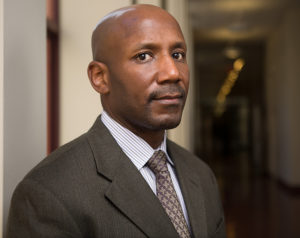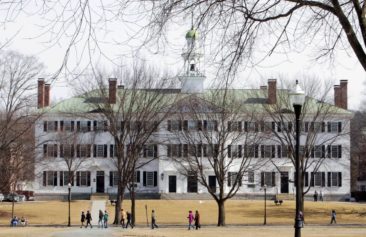The elite institution of Dartmouth College is in the headlines this week after it was revealed that the Ivy League school will be offering a class this spring that studies the Black Lives Matter movement and looks at “race, structural inequality and violence in both a historical and modern context.”
But while many will hail Dartmouth for what appears to be a progressive investigation of racism in America, the very presence of this course on the Hanover, New Hampshire, campus demonstrates the racial hypocrisy that still swirls across America. Dartmouth was founded by a slave trader, Reverend Eleazar Wheelock, who relied heavily on the institution for his family’s survival when he arrived in Hanover in 1770.
In addition, one of the first scientific acts in the creation of Dartmouth’s medical school was when Wheelock’s physician boiled the body of an enslaved Black person who had died and wired up the skeleton to use in instructing students, according to scholar Craig Steven Wilder, author of the book “Ebony & Ivy: Race, Slavery, and the Troubled History of America’s Universities.”
So while many will commend the school for tackling the subject of Black Lives Matter in its classrooms, in fact the school was founded with a heavy reliance on an institution whose basic principle was that Black lives didn’t really matter at all.
The Dartmouth course is entitled “10 Weeks, 10 Professors: #BlackLivesMatter” and will be divided up into 15 sections, involving more than 10 academic departments, including anthropology, history, mathematics, English and women’s studies, according to the Dartmouth student paper. The course will actually be taught by about 15 different Dartmouth professors.
“We hope students will be able to understand that Ferguson is not just an event in 2014, but something that’s tethered in time to a long history and still-emerging ideas about race in the U.S. and how policing works in an age of social media and distributed surveillance,” English professor Aimee Bahng told the Dartmouth paper.
Anthropology professor Chelsey Kivland said this is an opportunity “to use Ferguson as a starting point for broadening the conversation about the national problems of inequality, race and violence.”
But when American institutions are placed in their historical context, the picture quickly gets murkier. The very school where these subjects are being explored was one of the starting points for the creation of America’s systemic elevation of white supremacy.
In an interview on Democracy Now, Wilder said this about the man who founded Dartmouth, Rev. Wheelock:
“In many ways, I think Dartmouth was a perfect example of what I ended up arguing in the book, that we have to think of colleges as animate, as actors in the colonial world and in the creation of the nation that we know,” he said. “The Reverend Eleazar Wheelock, who arrives in Hanover after he gets his charter in 1769, he arrives several months later with eight enslaved Black people, including a baby. He has more slaves than he has faculty. He has more slaves than active trustees. He has more slaves, if you do an honest accounting, he probably has more slaves than he has students. And by that time, although he spent most of his life as a missionary to Native Americans—and the college is founded, and certainly its supporters believe that he’s continuing the Native American ministry—in fact, Native American students had been relegated to what was basically a grammar school. And Wheelock was in the process of building a college for white students. And like a lot of colleges that took money for Native American evangelization, a lot of that money actually ends up going to support white students and transform them into missionaries and ministers.”
Wilder later said in the interview that Wheelock, the first president of Dartmouth, “spent much of his life as an Indian missionary. But he’s also run a side business buying and selling people for labor, so that enslaved Black people have been part of his life’s work from his earliest years.”
As for Dartmouth’s medical college, Wilder said that “it would be unfair to say that the medical college begins with this moment, but the teaching of science in Hanover begins when the physician to the president, the founder of Dartmouth, Eleazar Wheelock, drags the body of an enslaved Black man, who is deceased, named Cato, to the back of his house and boils that body in an enormous pot to free up the skeleton, to wire it up for instruction.”
“That act is not unusual,” Wilder added. “In fact, when the first medical colleges are established in North America in the 1760s—the first is at the College of Philadelphia, which is now the University of Pennsylvania, and the second is at King’s College, which is now Columbia—when those institutions are founded, actually, they’re founded in part—part of what allows them to be established is access to corpses, access to people to experiment upon. And, in fact, it’s precisely the enslaved, the unfree and the marginalized who get forcibly volunteered for that role.”



